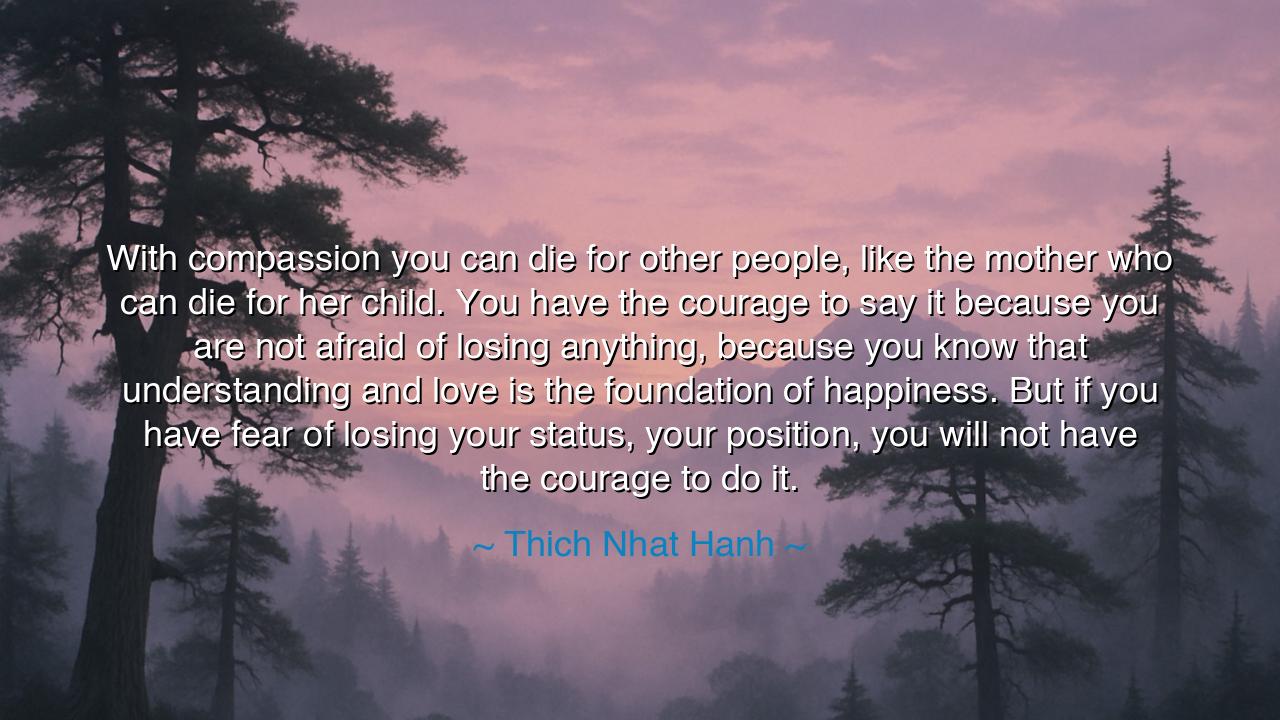
With compassion you can die for other people, like the mother who
With compassion you can die for other people, like the mother who can die for her child. You have the courage to say it because you are not afraid of losing anything, because you know that understanding and love is the foundation of happiness. But if you have fear of losing your status, your position, you will not have the courage to do it.






“With compassion you can die for other people, like the mother who can die for her child. You have the courage to say it because you are not afraid of losing anything, because you know that understanding and love is the foundation of happiness. But if you have fear of losing your status, your position, you will not have the courage to do it.” Thus spoke Thich Nhat Hanh, the gentle monk of Vietnam — a man of silence, of peace, and of boundless compassion. In these words, he offers a teaching as deep as a river and as fierce as fire. He reveals that true courage is not born of pride, but of love, and that the one who loves purely, without fear of loss, becomes unshakable. For compassion, when perfected, gives birth to the greatest strength — the strength to give oneself completely, even unto death, for the good of another.
The meaning of this teaching lies in the union between love and fearlessness. Many believe courage to be the absence of fear, but Thich Nhat Hanh shows us a higher truth: that courage springs from understanding — from seeing that nothing truly belongs to us, not even life itself. The mother who gives her life for her child does not weigh her sacrifice; she acts without hesitation, for her love has freed her from the chains of self. The one who clings to wealth, position, or reputation cannot love in this way, for every attachment breeds fear — the fear of losing what one possesses. Compassion, therefore, is not mere kindness; it is liberation. It frees the heart to act with purity and courage, unclouded by the shadow of loss.
The origin of these words is rooted in the very life of Thich Nhat Hanh, who lived through the sorrows of war and exile, yet never abandoned peace. Born in Vietnam during an age of turmoil, he witnessed the devastation of his people and the hatred that divided them. Yet, instead of choosing sides, he founded a movement of “Engaged Buddhism,” teaching that understanding and love — not violence or ideology — are the only true paths to healing. He risked his life for this belief, standing before generals and governments alike, speaking peace to the deafened ears of war. He was exiled for his compassion, yet never bitter, never afraid. In his calm defiance, he lived the very truth he spoke — that love is stronger than fear, and that fearlessness is the child of understanding.
History itself bears witness to this truth. Consider Mahatma Gandhi, who, though frail in body, faced the might of empire armed only with compassion. He had no weapons, no throne, no armies — only the power of love and the unshakable courage that springs from it. Like Thich Nhat Hanh, he understood that the man who loves deeply cannot be conquered, for his heart does not cling to wealth, or status, or even life. Or remember Mother Teresa, who walked through the streets of Calcutta, cradling the dying in her arms, unafraid of contagion, unafraid of judgment. Her compassion made her fearless, for she sought no reward but the act of love itself.
Thich Nhat Hanh’s teaching reminds us that fear is the root of all cruelty and indifference. When we fear losing power, we control others. When we fear losing love, we grasp and possess. When we fear losing comfort, we turn away from suffering. Yet, when we awaken to understanding, we see that everything we cling to is impermanent — and so we are freed. Compassion arises naturally from this freedom, for the heart that no longer clings becomes vast enough to embrace the whole world. In such a heart, there is no separation, no “me” or “them,” only the quiet strength of love that serves without condition.
To live by this wisdom, one must cultivate both mindfulness and fearlessness. Begin by observing your fears — the fear of losing control, the fear of being misunderstood, the fear of giving too much. See how these fears close the heart. Then, breathe deeply, and let understanding dissolve them. Remember that status, position, and even life itself are but passing clouds, while compassion is the eternal sky. Practice acts of love each day — small, steady offerings of presence, kindness, and forgiveness. For in every act of compassion, you are training your soul to let go, and in letting go, you are becoming free.
The lesson, then, is this: Compassion is the highest form of courage, and love the only true foundation of happiness. The one who fears nothing, because he holds nothing, can give everything. Such a soul becomes like a river that flows endlessly, nourishing all it touches. When you feel afraid to love — afraid to speak the truth, to help the suffering, to stand for what is right — remember Thich Nhat Hanh’s words. Remember that it is not bravery to fight for power, but courage to live for love. And when love fills your heart so completely that you no longer fear loss, you will discover what the masters knew: that to give yourself fully is not to die, but to awaken — into the boundless joy that is the very essence of compassion.






AAdministratorAdministrator
Welcome, honored guests. Please leave a comment, we will respond soon